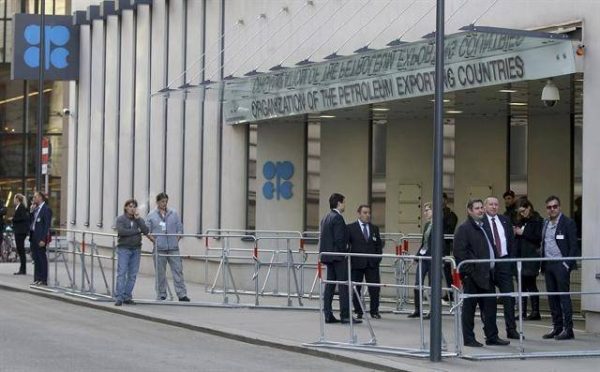
VIENNA (AP) — OPEC has persuaded 11 non-members to cut oil production, a move aimed at draining a worldwide oil glut and boosting low prices that have squeezed government finances in Russia and Saudi Arabia.
Officials said Saturday that non-members agreed to cut 558,000 barrels per day for six months starting Jan. 1, and that the deal was renewable for another six months after that. The figure was less than the 600,000 barrels a day that OPEC had hoped for.
Those non-member cuts come on top of an OPEC decision Nov. 30 to reduce member output by 1.2 million barrels a day.
Saudi oil minister Khalid Al-Falih called Saturday’s deal “historic” and said it would stabilize the market through next year and encourage industry investment. The announcement came after OPEC member states met with Russia and other non-OPEC countries in Vienna for talks.
Al-Falih said the deal “is meant to accelerate the natural process of rebalancing” the oil market.
The 11 non-OPEC countries taking part in the agreement are: Azerbaijan, Bahrain, Brunei, Equatorial Guinea, Kazakhstan, Malaysia, Mexico, Oman, Russia, Sudan and South Sudan.
OPEC Secretary General Mohammed Barkindo said much of the production cuts were expected to come from Russia, which co-chaired Saturday’s meeting.
Major oil producers such as non-member Russia and cartel leader Saudi Arabia have seen a worldwide oversupply send prices lower and reduce revenues to government budgets.
It remains to be seen whether the cutbacks will do much to raise prices, given OPEC members’ track record of exceeding agreed-upon production quotas, and due to weak uptake from a sluggish global economy.
Some non-OPEC countries such as Mexico were already seeing production wane due to weak demand. Al-Falih said “the intent by all those who participated is to contribute to drawing down oil inventories that are excessive.”
“And whether the reduction in that over-supply comes from deliberate intervention – like it is the case in Saudi Arabia – or by simply managing the decline in a way that makes them meet this agreement is left to the countries themselves,” he said.
Oil fell from over $90 per barrel in early 2014 to as low as $40 earlier this year, briefly sending the average price of regular gasoline at the pump to under $2 for motorists in the United States. Oil closed at $51.58 on Friday, up 6 percent since the OPEC production cut was announced.
© 2016 The Associated Press

Leave a Reply
You must be logged in to post a comment.